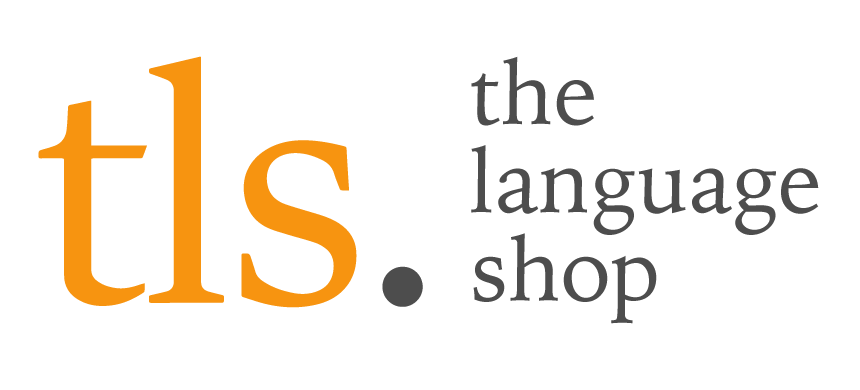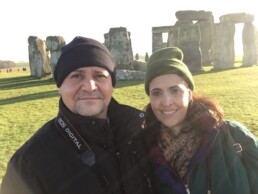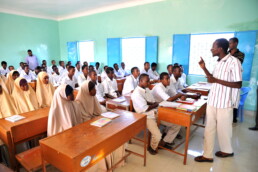Linguist Story
Every month in our newsletter, we get to know a bit more about one of our linguists. This month, we have a husband and wife team for you! José (Enti) Bracamonte and Susana (Marisú) Basagoitia both work as Spanish interpreters.
Tell us about the work you do for TLS
Enti: I do over-the-phone and face-to-face interpretation work. I was onboarded on the same day as my wife. We have always worked together (over 25 years now), so we were both very happy that The Language Shop accepted us. We are very grateful.
Marisú: I am an English/Spanish interpreter, and I very much enjoy helping TLS clients communicate with their service users. I mostly do telephone interpretation work, but I also enjoy helping people communicate through video calls and face-to-face.
What’s been your favourite project at TLS?
Enti: The conversations we are brought into are obviously important to the parties involved, so I approach them all with the same keen spirit of service. That said, beyond my honest desire to help others, also lies a selfish desire to learn and grow that can only be fulfilled with experience; therefore, every telephone call, every video call, every face-to-face conversation is important to me.
Marisú: Although I can’t say that I have any favourite projects, I do love working with people and helping in any way I can. I really do my best to facilitate communication by speaking calmly, clearly and carefully, finding the most appropriate words for the situation.
What has been your biggest challenge?
Enti: Before moving to the UK, I worked mainly as a conference interpreter for the International Law Enforcement Academy. Telephone interpreting is vastly different and it poses many new and interesting challenges.
Marisú: Every mode of interpreting comes with a standard set of challenges, but the one thing most people would probably never guess is visual input. A very big challenge for a conference interpreter who is making the switch to telephone interpreting is not being able to see the person who is speaking. Working without visual input requires you to adapt and use different skills.
Can you tell us about a time your work has made a difference to someone’s life?
Enti: My wife and I used to do lots of field work back in the day, when we first met, with volunteers and experts that sought to bring economic development to the most impoverished areas in El Salvador. Inevitably, there would sometimes be distrust among the local population. When suspicions ran high and tempers began to boil over, Marisú and I were always quick to help defuse the situation and to point out, as early as possible, the potential areas of conflict that might arise.
Marisú: Whether they ever become aware or not, interpreters always make a difference for the people they assist. A mother seeking help for her child, a solicitor wanting to help a client, a doctor trying to diagnose an ailment; there are tons of everyday-life examples where interpreters make a big difference in people’s lives. What I do is very rewarding and, although I sometimes don’t get to see the smiles, most of the time I get to hear them for sure. I can’t imagine doing anything else.
Tell us something interesting about you
Enti: I love dogs. I used to feed and help strays in the rural area I used to live in, before moving to the UK. Also, I am a hardcore heavy metal fan, and I have recently taken up cooking as a hobby—out of sheer necessity.
Marisú: My husband, José Enti, and I have worked together since 1997. Back in El Salvador, we both worked, for 15 years, as conference interpreters for the International Law Enforcement Academy (ILEA), which provides training for judges, prosecutors, police officers, and other law enforcement officials from Latin America and the Caribbean. The ILEA instructors come from various US federal, state and local law enforcement agencies.
What are your ambitions for the next 12 months?
Enti: As a family, we are still trying to adapt to our new life in the UK, and there is lots of work that still needs to be done on that front. My main goal for now is to help my family get a proper foothold on which to build.
Marisú: I would like my family to be able to travel a little (husband, children, and grandchildren), which means increasing our household income, saving where we can and making a few healthy sacrifices (no sodas, no sweets, no junk food).
To learn more about Enti and Marisú, you can visit their website:
therandomfactor.com
Your month ahead - Important upcoming dates for your calendar
18 July – 17 Aug – South Asian Heritage Month
Since 2019, South Asian Heritage Month has celebrated the culture and contributions made by people from this part of the world living in the UK. There are millions of South Asians and their descendants living in this country, with large numbers of people having moved here in the Post War Period and following Indian Independence and Partition in 1947. The theme of this year’s Heritage Month is Free to Be Me and aims to encourage the next generation of children of South Asian descent to ‘feel empowered in their identity and proud of who they are’. Find out more here.
28 – World Hepatitis Day
World Hepatitis Day raises public awareness about viral hepatitis, promotes prevention and encourages testing and treatment. The World Health Organization (WHO) leads on the day and urges us to come together to help eliminate hepatitis by 2030. Read more about the background of this day and find out the theme for 2024 when it is announced here.
July’s dates at a glance
Religious/cultural
1 – The Apostles’ Fast begins - Orthodox Christian
3 – Feast of Saint Thomas the Apostle, Christian
5 – Birthday of Guru Hargobind, Sikh
7 – Islamic New Year, Islam
9 – Martyrdom of The Báb, Baha’i
15 – Saint Vladimir the Great Day, Orthodox Christian
17 – Ashura, Islam
21 – Asalha Puja (Dharma Day), Buddhist
22 – Feast of Saint Mary Magdalene, Christian
23 – Birthday of Guru Har Krishan, Sikh
23 – Birthday of Emperor Haile Selassie, Rastafari
24 – Pioneer Day, Mormon Christian
25 – Saint James the Great Day, Christian
Awareness and Events
14 – International Non-Binary People’s Day
18 – Nelson Mandela International Day
18 Jul-17 Aug – South Asian Heritage Month
28 – World Hepatitis Day
in other news: stories from the language industry and beyond
ITV promises BSL version of election debate after legal threat - BBC News
Where Are My Mother's Teeth? Language Barriers Limit Seniors' Access To Healthcare (indiacurrents.com)
Simple ways to make hiring more inclusive for disabled people - Diversity and Inclusion Leaders – Accelerating workplace inclusion (dileaders.com)
Remote interpreting: best practice hints and tips
Since the Covid-19 pandemic outbreak, our remote interpreting services have continued to grow in popularity, whether by telephone or video, scheduled or on demand.
This relatively new way of working comes with its own set of requirements and best practices – here is some advice on how to get the most from your remote interpreting booking:
- Are you sure of your wifi connection? If not, have a contingency plan in place, e.g. switching from video to telephone if necessary. Hint: lowering the quality of your video feed in settings can help with connection issues.
- As with face to face bookings, make sure the space you’re in is quiet and private.
- Use headphones to improve sound quality and ensure confidentiality.
- Use a separate device from your service user where possible. When using video, the interpreter must be able to easily see all parties.
- When using video, agree beforehand how all parties must signal their turn to speak, e.g. by raising their hand. Using telephone interpreting, establish how the conversation will be run at the beginning of the booking.
language fact file: Hindi
Spoken widely in: India, Nepal, Mauritius, Fiji and many others.
Number of native speakers: approximately 615m!
Learn some: There are a number of ways to greet someone warmly in Hindi. ‘Namaste’ and ‘namaskar’ are quite traditional and respectful, as is ‘salaam’, but all are widely used. If you want to be more casual, you can use ‘kaise ho’ (pronounced keh-se hoh) to greet a man or ‘kaisi ho’ (pronounced keh-see hoh) to greet a woman.
Fast facts:
- Hindi is the fourth most widely spoken language in the world, after Mandarin, Spanish and English. In addition to being an official language in India and Fiji, it is spoken by Indian diasporic communities all over the world. There are large Hindi-speaking populations in England, Trinidad and Tobago, the US, Canada, Mauritius, South Africa and parts of the Middle East.
- Hindi’s written language system, Devanagari, contains 36 consonants and 11 vowels. This makes it simpler than English to read aloud, as words are spelled exactly as you pronounce them.
- As an English speaker, you already know loads of Hindi words! Everyday words we have adopted from the language are: avatar, bandanna, bungalow, dinghy, guru, jungle, khaki, karma, loot, mantra, nirvana, punch, pyjamas, sorbet, shampoo, thug, typhoon and yoga.
Staff Member’s Story: Katy Frankland, TLS bookings team
This month, we would like to introduce one of our team who works behind the scenes to keep our customers supplied with linguists: meet Katy Frankland, one of the TLS bookings team.
“I work for the ODI team for TLS. This mostly involves answering calls from the booking officers, taking their details and sourcing and connecting an interpreter to match their needs. We also have to assist with pre-booked appointments and general enquiries from both the requesters and the interpreters."
“The role has evolved greatly since I first started in October 2022. There have been great improvements to the IT systems we use, and it is definitely a lot busier. It can be hard work when it is call after call but it is satisfying to interact with the interpreters and learn about them and their cultures."
“I work from home so it’s good to have the great back up team to assist with our enquiries."
“I have had short term work in France and Holland and worked in Tenerife for 9 years, so I have an interest in languages. I have two sons: Daniel who is 16 and Olly who is 14 - and Gary the cat. I live in Baildon in West Yorkshire but I am a massive Everton supporter."
“My proudest moment so far has been going to see my son pass out in the Royal Navy last month. I hope to have many more years working here with all the lovely staff at TLS.”
Vista: an upgrade to improve your experience
Our Operations Team is always looking at ways to make your interactions with TLS even easier - so you may have noticed that our tailored bookings system, VISTA, has had a little makeover. Here is what we have changed:
- Streamlined Navigation Menu: we’ve enhanced the menu icons with descriptive text to guide you through our platform.
- Everything you need in one place: no more searching or scrolling - everything you need is always visible in the navigation menu.
- Options for Create New, Future and Past bookings are now positioned for quicker access, ensuring you can create or manage your bookings quickly, no matter where you are in the system.
- Your personal access code and our On-Demand contact number are now always visible in the top left corner of the navigation menu.
- Upgraded Booking Overview: a more comprehensive view of your bookings with enhanced details, including booking status, all at a glance.
Any feedback on our changes or VISTA? Speak to your account manager or email bookings@languageshop.org
On the calendar - important dates for your calendar (May)
20/21 – Litha, Pagan/Wiccan
Litha marks the summer solstice – the longest day of the year. For pagans, it is a celebration of the sun and the light and energy it brings to all life. Many celebrate by lighting bonfires or staying up all night to watch the sun rise. There is a big celebration of the solstice every year at Stonehenge, where the famous stones align perfectly with the rising sun.
22 – UK Windrush Day
Every year, Windrush Day marks the anniversary of the first 800+ post-War Caribbean migrants’ arrival in Britain, on HMS Windrush.
At the time of arrival these migrants were British subjects who were invited to help rebuild the country after WW2. However, many of these people later had their citizenship wrongly removed in what is known as the Windrush Scandal. Windrush Day honours their contribution and highlights the injustices of the scandal. Small grants are available to community groups wishing to celebrate the day; read more here.
FREE online events
Regional health inequalities Tickets, Wed 5 Jun 2024 at 13:00 | Eventbrite Three ten-minute talks covering the health inequalities between the English regions.
Supporting Men’s Health in the Workplace Tickets, Mon, Jun 10, 2024 at 1:30 PM | Eventbrite Looking at core issues affecting mens’ health in the workplace and how to better support men at work.
June’s dates at a glance:
Religious/Cultural
5 – Yom Yerushalayim, Judaism
7 – Feast of the Sacred Heart of Jesus, Catholic Christian
12-13 – Shavuot, Judaism
13 – Feast of the Ascension, Orthodox Christian
15-19 – Hajj, Islam
16 – Waqf Al Arafa, Islam
16 – Martyrdom of Guru Arjan Dev, Sikh
17-20 – Eid Al-Adha, Islam
20 – Litha, Wicca and Pagan
22 – Saturday of Souls, Orthodox Christian
23 – Pentecost, Orthodox Christian
24 – Nativity of Saint John the Baptist, Christian
25 – Eid Al-Ghadir, Islam
29 – Feast of Saints Peter and Paul, Christian
Awareness and Events
4 – International Day of Innocent Children Victims of Aggression
8 – Global Wellness Day
9 – Race Unity Day
10-16 – Men’s Health Week
12 – World Day Against Child Labour
15 – World Elder Abuse Awareness Day
16 – Father’s Day
17-23 – Refugee Week
18 – Autistic Pride Day
20 – World Refugee Day
20 – Summer Solstice
22 – UK Windrush Day
24-28 – School Diversity Week
27-28 – TUC's LGBT+ Conference
In other news: stories from the language industry and beyond (May)
DEI is a lightning rod for controversy – but the practice isn't dead - BBC Worklife A look at DEI initiatives in the workplace in the context of continuing debate about their place.
North East firefighters to learn life-saving sign language skills - BBC News BSL training has been rolled out to the Tyne and Wear Fire and Rescue Service after two visits to schools with Deaf children highlighted the need to improve communication skills.
Language Fact File - Somali
Spoken in: Somalia, Ethiopia, Djibouti and northeastern Kenya.
Number of native speakers: 24 million
Learn some: Greet a long lost friend with ‘Wakhti dheer kuma arag!”, which means ‘long time, no see’.
Fast facts:
- The Somali language originated in the Horn of Africa, probably in the first millennium BCE. This region is known for its linguistic richness and diversity, due to the historical trade and contact between different ethnic and cultural groups there. The predominant influence on the language has been Arabic.
- Somali is officially written using a modified Latin alphabet, which replaced Arabic script in the 1970s. There are however three other writing systems also in use: Wadaad, Osmanya and Borama.
- It is an extremely difficult language to learn! It has sounds from Arabic that learners tend to struggle with (kha, emphatic ha, qaf), tones similar to those used in the Mandarin language, irregular plurals, and an incredibly complex system for prepositions. What is more, Somali poetry is very culturally important and native users of the language often draw on classical poems in their everyday speech – leaving the uninitiated very confused!









